Milam County Historical Commission
Milam County, Texas
Milam County, Texas


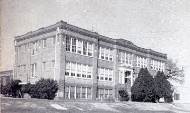
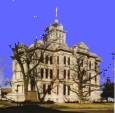


JULIUS (BOSE) MOULTRY
1894 - 1978
Blacksmith – 72 years
Julius (Bose) Moultry was the fifth son in a family of 13 children born to Paul and Susie
Nunn Moultry in the City of Rockdale. At the age of 12, while yet attending the Rockdale
Colored School, he persuaded his father to let him be his helper in the blacksmithing
business. He worked with his father until World War I , when he was drafted into the
services.
With his ability to shoe horses, he was assigned to the calvary in Fort Riley, Kansas to
shoe horses, and later overseas in England and France, serving in this area for 9 months
and 25 days. He also played trumpet in the Regimental Band.
He returned to the states and was back in Rockdale, July 9, 1919. He resumed his
horseshoeing, and started for B. Ashby in a shop situated on a lot across the street from
the present post office.
His first blacksmith shop was in Thorndale, Texas, but it was mysteriously destroyed by
fire. In 1924, he went into business for himself, opening a shop at a location which was
formally Gaither Motor Company. From this location, he moved to a lot located directly
behind the present Citizen National Bank. His last location was just beyond the Missouri
Pacific tracks, about one block west of South Main Street.
He was very famous for his horseshoeing ability. Each year he was recruited to
Fredericksburg and the state of New Mexico to shoe the famous race horses. He was also
skilled in making branding irons, hand designed trailers and barbeque pits from discarded
steel drums.
In 1968, Julius “Bose” received a letter from the Institute of Texas Cultures Hemisfair
headquarters in San Antonio, requesting information on the art of blacksmithing dating
back to his father’s entry into Texas. An anvil, picture, and resume’ of Paul’s
blacksmithing are now a part of the Ethnic Culture program in the Institute of Texas
Cultures .
Julius “Bose” was also requested by the Institute to make a branding iron for the
Festival of the Smithsonian Institute in 1970 to represent Texas Cultures in Washington,
D. C. along with an invitation to attend, and an all-expense paid trip given at the same
time. A substitute replacement had to be made because of his ill health.
In addition to his skilled blacksmithing, Julius “Bose” had a 10 piece brass band
consisting of the Moultry brothers, the Shields brothers, and the Fannin Brothers. This
band played for many county fairs and Juneteenth celebrations during the thirties and
early forties.
He was married to Eula Bell Crayton of the Liberty Hill Community, and they were parents
to one daughter, Susie E.M. Piper.
Julius “Bose” blacksmithed until age 72. He passed away in 1978 at the age of 84.
Remembering Daddy
by
Susie E. Sansom-Piper
Daddy was the 7th child in a family of four boys and six girls. His given name was
Julius, but everyone called him “Bose”. He was a descendant of Paul Moultry, a former
slave, who made his way to Texas after the Emancipation Proclamation. His father was the
first known Black man in the settlement of a small area, which later became the City of
Rockdale. Grandpa Paul trained his four sons to become blacksmiths. My father was the
third blacksmith in the family.
I can still picture him as he walked to his blacksmith shop each day on Boga Street. His
old felt hat wore the signs of coal dust from the fuel used in the hearth where he heated
and tempered the iron to sharpen and shape farming tools or perhaps make a special
branding iron for the ranchers. His faded blue overalls, (also called duckings) had many
patches over the numerous holes that were burned by sparks, or simply worn through from
hoisting the hoofs of race horses on his knees.
In earlier days, boys had a very limited education, so Daddy was only able to complete
the fifth grade, so by the age of 12, he was a full time blacksmith in my grandfather’s
shop, which was located near the old City Cemetery, or at the intersection of what is now
known as First and Second Streets. With his limited knowledge, he successfully operated
his own business for more than 60 years or until health failed him.
And then came World War I. Daddy was drafted into the army, but because of his musical
ability, he was assigned to the Army Band. This group was sent to France to entertain
soldiers on the battle front. Daddy often said: “Times were hard. We had to survive on
a bread that was called “hard tack” because of its toughness, but somehow, we made it. “
He always talked of their return to the states. He said: “We landed in New York City,
and from the ship, we boarded the train. The sad part is that we had to remain on that
train because of our race, all the way back to Texas.”
I always enjoyed the tales he told when he began “courting” my mother after the war. He
said, “I had an automobile called a Hutmobile. Your mama lived out in the country about
eight miles away, in an area that they called Bow Den. Mr. John Crayton, her father,
could always tell when I was on my way to see your Mom, for he would announce boldly:
“Eula, Bose is on his way to see you.” The motor was so loud on the car, until it could
be heard four or five miles away. Then at 9:00 p. m., Mr. Crayton would make his second
announcement. “It’s 9:00 O’Clock, and bedtime with us Jacks.” This meant that it was
time to leave. It wasn’t long before my seventeen year old Mom and Dad married. They
moved to the little town of Thorndale, a great farming area, and he began to operate his
first blacksmith shop. It wasn’t too long, before the shop mysteriously burned to the
ground. Afterwards, he moved to Rockdale, and for the next few years he worked with his
two brothers, Buddy and Johnnie. Then he opened a shop in the downtown area, and
remained there for the next five years, or until a local bank purchased the lot for a
parking area. He purchased and built a shop on Boga Street, and remained in this area
until retirement.
Shortly after moving to Rockdale, I entered the picture. He always said that I was a
very active baby, walking and talking at an early age. He said: “I always shaved with a
straight razor, and used a mirror propped on the chair. You decided that you would like
to shave also, so while my back was turned, you used the razor, and narrowly missed
cutting your throat.” I still carry the scar.
Daddy had a Jazz band consisting of four Moultry Brothers, three Shields Brothers, and
three Fannin Brothers. This band was well known in the late twenties and thirties. They
played for all of the surrounding county fairs and White dances. During these years,
everything was segregated. Daddy played the trumpet, and I can remember some of the
songs....”Should I?” and “Careless Love.”
Many times, the farmers were not able to pay my Dad with money, so often the pay
consisted of meat, poultry, vegetables or fruit. We never had to worry about food.
Daddy had great building skills. He could take the chassis from an automobile,and build
a trailer similar to the horse trailers of today. Through the years, I have often
lamented that he knew nothing about patents in those days. He was well known for emblems
and branding irons, and would make them from scrap irons. He was the designer of the
emblems that graced the fence posts of the late H. H. Coffied ranches. He also made
barbecue pits like those of today, from iron drums. He wore the name of the “best horse
– shoer” in the southwest, and was often recruited by race track owners in
Fredericksburg, Texas, New Mexico and Arizona to shoe the horses during racing season.
During dormant seasons, he and his buddies always enjoyed domino games on the homemade
table in the back of the shop.
My fondest memory of Daddy is his quietness and his wisdom. The piece of advice that he
gave me at the beginning of my lifetime career, has always been my stabilizer. I was
experiencing some unfavorable conditions with my new co-workers, so I talked with my
father. Calling me by the nickname he gave me, he said: “Bug, when people mistreat you,
beware. But you still treat them very nice. Just remember to stay your distance,
though, and feed them with a long-handled spoon.”
Daddy passed away in 1978 at the age of 84, but in my heart, I can always say: “Thanks,
Dad.”
This article was written and photos furnished by Susie Sansom-Piper
All credit goes to Ms. Sansom-Piper
All credit goes to Ms. Sansom-Piper
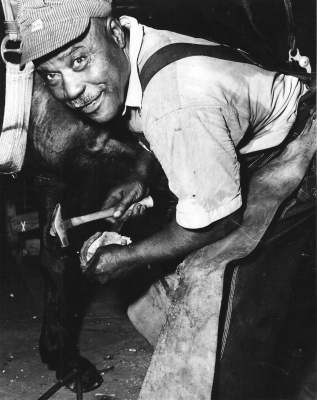
Julius "Bose" Moultry
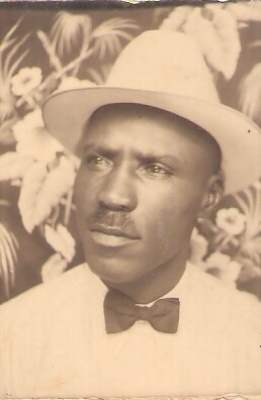
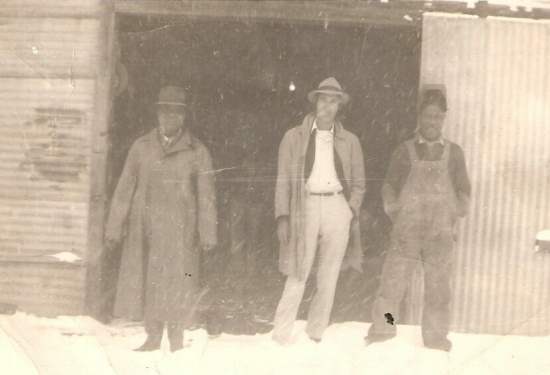
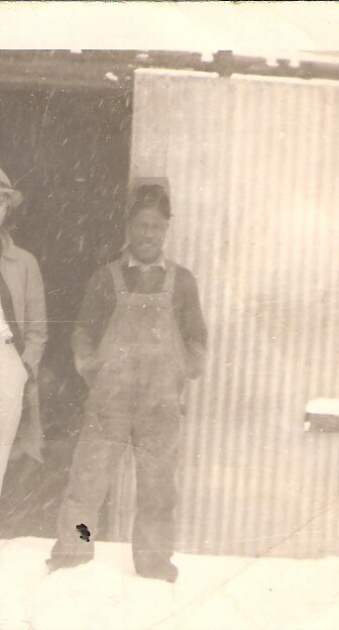
Julius "Bose" Moultry at his blacksmith shop
Julius "Bose" Moultry
(at right)
Other two men are believed to be
Sydney Mullins and
J. D. "Zero" Miller
(at right)
Other two men are believed to be
Sydney Mullins and
J. D. "Zero" Miller
.